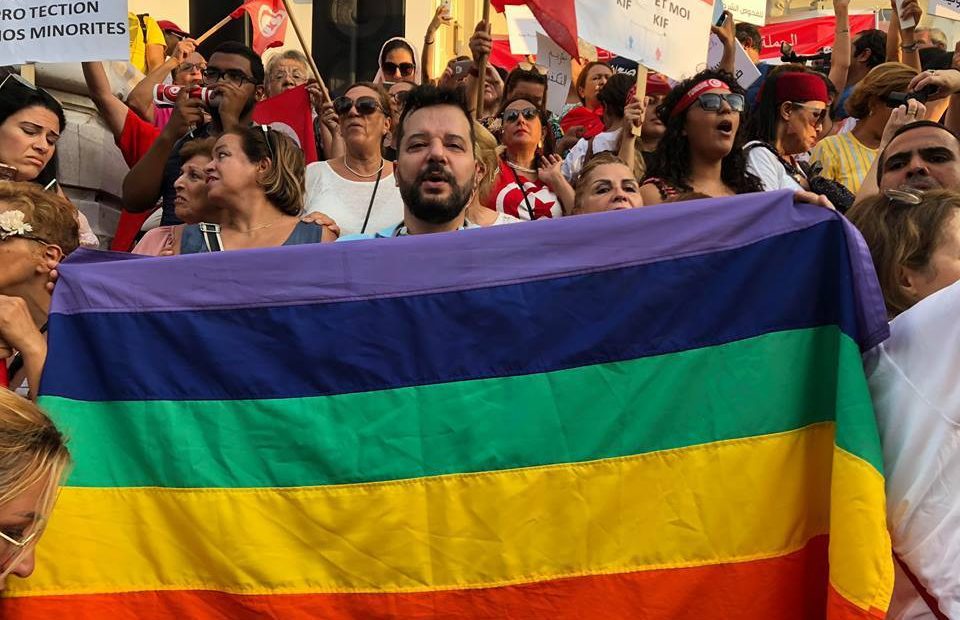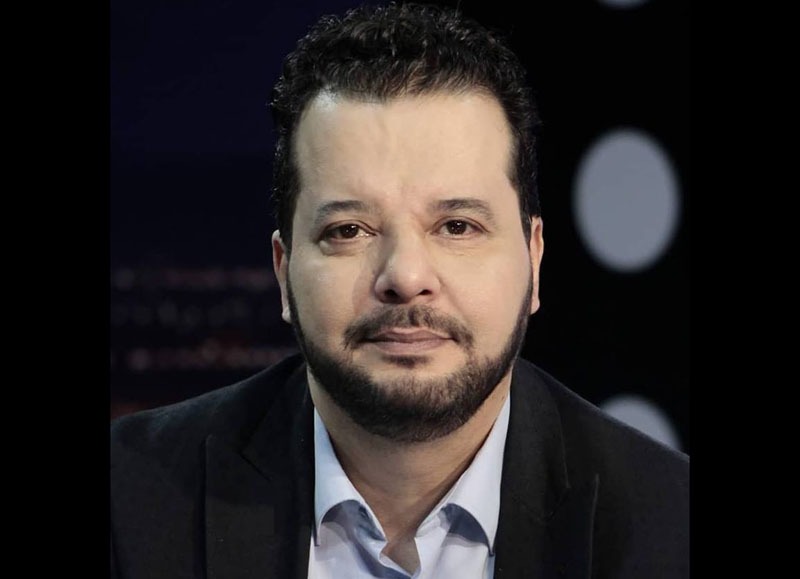Mounir Baatour is an openly gay Tunisian lawyer, politician, and LGBTQ+ activist. He’s the co-founder of Shams (an organization fighting for LGBTQ+ rights in Tunisia), and a prominent activist within the organization. His decision to run for president, which he announced last June, sparked huge controversy surrounding his legitimacy, given the fact that homosexuality is prohibited in Tunisia and punished with up to three years of imprisonment (according to Article 230 of the Civil Penal Code). Passport magazine spoke with Mounir Baatour to learn more about his political program, insights, and his personal experience as a LGBTQ+ person living in a repressive, authoritarian country.
By Tharwa Boulifi
Mr. Baatour, what motivated you to run for president in a conservative country, such as Tunisia?
When I decided to run for president, I presented myself as the Tunisian Liberal Party president. So [foremost, I decided to run] as a politician. Afterward, many publications took advantage of the fact that I’m a co-founder of the Shams organization and was imprisoned for homosexuality, in 2013. They used this information about my sexual orientation to create a buzz in the news and controversy among the Tunisian people. They focused on my personal life more than my political skills. For them, it’s just a gay running for president, not a politician. If it was any other “straight” politician, there wouldn’t be such a controversy about their candidacy. I want the Tunisian voters to see me as a politician, without distortions.
What were the different reactions that you got after announcing your decision? Did you except them?
Many people think that it’s my right as a citizen to run for president. They have always encouraged me and are very happy with my political path. The conservatives’ reaction was quite predictable. They were clearly against my candidacy. They prefer focusing on my sexual orientation rather than my political skills. For them, I represent a real shame for my country and the Tunisian Lawyers’ counsel. When I announced my decision to run for president, many media outlets covered the news and highlighted the fact that I was a gay lawyer. In fact, these colleagues consider that a gay running for president undermines the law profession’s reputation and the country’s. But, I don’t care about their opinions. For me, my ideas, those of my counselors, and my political program define my candidacy.
How did you come out as gay, in a country where homosexuality is punished by the law?
I didn’t come out in a special way or with special manners. Well, I had a boyfriend with whom I lived. My family knew about my boyfriend and me and hence understood that I was gay. It wasn’t really a topic of hot discussion. I also told a few of my closet friends. So yeah, I didn’t shout it from the rooftops. However, I was arrested in 2013 and jailed for three months for being gay. Back then, my case created controversy and that’s how the media knew that I was part of the LGBTQ+ community.
You’re also a co-founder and an active member of Shams, an organization that fights for LGBTQ+ rights in Tunisia. Can you tell us a bit about your activism within the organization?
The main goal of our organization is to initiate a societal debate and to make the media tackle LGBTQ+ issues, and to explain to the public that identifying as an LGBTQ+ is something natural and normal. Homosexuality is not a choice, or a disease, or perversity. We are also lobbying representatives and deputies, so they can abolish Article 230 of the Tunisian Civil Penal Code and stop the anal examination (to prove whether there was any sexual intercourse). But most importantly, we want to stop the arrests of LGBTQ+ people by the police. Recently, I published a Facebook post, where I denounced the arrest of two young gay people, who were sentenced to one and a half years in prison. Our organization actually follows all the persecution cases against the LGBTQ+ community and some lawyers volunteer to defend the people being persecuted. We also offer accommodation to LGBTQ+ people who were rejected from their families and friends. Finally, we have a podcast with talk shows that are hosted by LGBTQ+ people to make their voices heard and to give other people from this community platforms to be visible.

Photo Via Mounir Baatour’s Facebook Page
Can you describe your political program, especially regarding LGBTQ+ rights in Tunisia?
Well, my political program is not only about LGBTQ+ rights. It includes a further liberalization of the Tunisian economy, facilitation of the administrative procedures for the investment and the termination of the governor’s authorization for the purchase of properties by foreigners. We also plan on changing the national currency, to force the informal sector to go to the banks and change the money they’re keeping in the black market. This changed money will be declared to the tax authority, which will hunt down those who are doing activities in the informal sector and who represent 50% of the Tunisian economy. The money we’ll gain will help us increase the welfare services, the needy families’ pensions, the retirement pension (for those under 400 dinars), increase the disability pension by at least 50%, the guaranteed minimum wage by 20%, and the students scholarships of 150 dinars. This is the economic and social aspect of my political program. Regarding the LGBTQ+ community, I will certainly abolish Article 230, which incriminates homosexuality, with a sentence of three years imprisonment. I will make sure that homophobia becomes an aggravating circumstance in case of assault, and permit transgender people to change their marital status. So, I’m not running for president, only to implement Sham’s program.
What do you say to young LGBTQ+ people in Tunisia who are afraid to come out and face society?
I tell them that they’re right about being afraid, that they don’t have to come out in such a hostile and conservative society. They need to wait till they become independent financially, so they won’t be pressured by their families or society, who will have a negative, even toxic impact on them. Today, Article 230 doesn’t convict homosexuals to three years only. It’s sentencing them to lifelong imprisonment, since a homosexual person, even after his imprisonment, won’t become less gay or lesbian. They’ll still be themselves, and because of that, they risk going back to prison. Some people were incarcerated three of four times, for the same crime. This is why I said that it’s a lifelong sentence. To those who claim that homosexuality is a disease, let’s suppose that it is one. Do you have any remedy, any tool to cure us? Do you imprison diabetic, hypertensive patients, to cure them? So, if you find this remedy against homosexuality, please enlighten us on that and we’ll gladly give the Nobel Prize for medicine. Our organization’s doors are always open to any LGBTQ+ person in need of any physical and emotional support. They can also reach us through our podcast or Facebook page. Vote for me and you’ll get all your rights, no matter your differences!
How can the people of Tunisia help bring about progressive change in the near future?
LGBTQ+ people have always existed, from time immemorial. Whether they’re embraced by the Tunisian society, they still are a part of it. It doesn’t change anything. It’s a fact; we’re here. We’re your siblings, your lawyers, your teachers, your doctors, your workers… In almost every family, there’s an LGBTQ+ person. So, accepting them or not, doesn’t change anything. For those who use Islam (which prohibits homosexuality) as an excuse, I want to remind them that Islam also prohibits adoption and encourages polygamy and slavery. Some islamologues (Islam scholars) even claim that homosexuality isn’t prohibited in Islam. But, I think that the Tunisian people are open-minded and progressive. We abolished slavery in 1846, polygamy in 1956, prohibited women’s’ repudiation the same year, legalized adoption in 1959, and abortion (up till four months) in 1965. Those achievements show the open-mindedness and modernism of the Tunisian people, who are always open to change and individual freedoms.
Do you have a favorite quote or saying that provides you with inspiration every day?
Yeah, it’s my own quote actually. It’s one of the reasons why I am running for president…
“It’s because your freedom is the most valuable thing that you have.”


